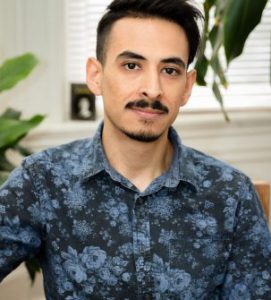
At age 5, Marcelo Hernandez Castillo crossed a desert.
It was spring 1993 when Castillo immigrated from Tepechitlán, Mexico, to the United States with his family of six, beginning his life as an undocumented person. His relationship to his citizenship status was governed by the “don’t tell anyone” mentality of his parents’ generation — a survival tactic that protected him, but also limited his voice as a poet.
“I had to pick up these habits in order to either blend in, or go under the radar or, essentially, fake my way through life,” he said. “I had a lot of fears about what I would write, how I would write and what it would say about me — how much to reveal about myself.”
Castillo, who has won the A. Poulin, Jr. Poetry Prize and a GLCA New Writers Award, would later become the first undocumented student to graduate from the University of Michigan’s MFA program. He is a founding member of the Undocupoets Campaign, a movement that eliminated citizenship requirements from all major first poetry book prizes, and has also helped establish the Undocupoet Fellowship to help undocumented writers fund submission costs to journals and contests.
As Week Four’s poet-in-residence at the Chautauqua Writers’ Center, Castillo will give a Brown Bag lecture titled “Trusting the Image to Live on Its Own” at 12:15 p.m. Tuesday, July 16 on the porch of the Literary Arts Center at Alumni Hall. The craft talk will theorize the image as “the smallest unit of measure that has a significant meaning” in a poem. He wants to discuss the idea that poems do not have to rely on simile and metaphor to convey description — instead, poets should “trust in the power of the images enough to stand on its own, to just be exactly what it is.”
He’s also interested in the world between images; the space wherein readers have to make their own leaps and associations, and cites James Wright and Richard Siken as poets who allow images to push their poems forward.
“Crush by Richard Siken completely changed the way that I approached things,” Castillo said. “It changed everything, everything, everything. What he’s able to do with his images — circumvent ‘A’ to ‘B’ to ‘C,’ and just go to ‘C.’ (The poetry book is) called Crush because it’s claustrophobic; it’s almost overwhelming how much information and emotion and imagery is packed into one thing.”
Becoming a father and developing his voice in the style of different genres affected Castillo’s writing, too. His son disrupted his steady writing rhythm, but clarified his perspective. Jumping between genres was an act inspired in part by his experience as an undocumented person.
“I came of age when it was not as OK to be as out and undocumented and proud of that,” he said, explaining that poetry was a way to write what he wanted “without really saying it.” Even after overcoming the immediate threat of deportation and family separation, he still finds it difficult to escape the “emotional resonances” of a life in hiding.
“All of the behaviors I had to adopt — that were inculcated in me — stayed there,” Castillo said. “The only way I could break out of that was by literally changing genres. I set out to write a memoir, which has to be more direct.”
Castillo’s memoir Children of the Land, forthcoming in 2020, forced him to speak plainly about his experience navigating a nation hostile to a lack of official papers. The openness of his prose translated to his life as a poet.
“I feel more emboldened,” Castillo said. “I finished that book before everything really exploded and changed with this administration. Poems I’ve written since then are much more directly related to my lived experiences. I am not afforded the luxury of being cryptic.”
He looks to Documents, a book of poems by Jan-Henry Gray, as an example of an undocumented immigrant “(using) the language of the state to subvert his experiences.” Valeria Luiselli’s Lost Children Archive is another work Castillo called “monumental and breathtaking.” But in 2019, Castillo reaches for Pablo Neruda, the Nobel Prize-winning Chilean poet and politician.
“Where I once went specifically (to Neruda) for his love poems and for his beauty, I now value him for taking a stance against what he saw was a totalitarian regime,” Castillo said. “Rather than solace, I go to his poems for courage.”




